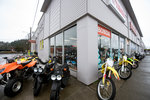
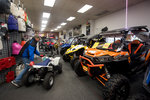
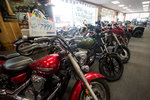
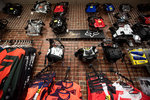
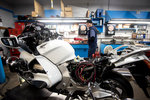
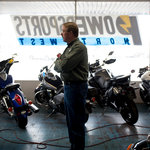
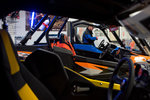
In the early 1970s, Dave Lipinski and Jeff Ashe, fueled by their love of racing dirt bikes, went to work as apprentice mechanics at Steve’s Suzuki in downtown Centralia.
“We lived and breathed motorcycles,” Lipiniski said. “We turned our hobby into a career.”
Forty years later, the two are co-owners of Powersports Northwest, which has expanded from basic dirt bikes to turbo-powered, 100-plus horsepower side-by-side quads and everything in between.
Today, Lipinski reflected, the business still caters to people who want to burn rubber in the great outdoors, but has also made changes while learning to survive in an economy in which fewer people have extra cash for recreational off-road vehicles.
“We just basically sold dirt bikes to start with. Four-wheelers didn’t even exist in the ’70s,” Lipinski said. “Our business now is quite a bit different than when it started.”
Powersports Northwest was founded in 1972 as “Steve’s Suzuki,” owned by Steve and Diane Rasmusson.
Lipinski started working at the dealership as a teenager in 1972 as an apprentice mechanic, among other duties. Ashe started at the shop in 1974. Neither ever left.
Lipinski and Ashe both worked at Steve’s Suzuki out of a love for dirt bikes. Both raced the bikes in the 1970s and 1980s with the Centralia Mudslingers motorcycle club.
Both have retired from the club, but Lipinski said he still spends some time on his Honda Gold Wing.
“I spend most of my time on my riding lawnmower,” Lipinski said.
They bought the business in 1977. In the following years, they added Yamaha, Honda and Polaris to their inventory. The business had several names over the years, but has been Powersports Northwest since 1992. They have been located at 300 S. Tower Ave. in Centralia since that year.
The business started with dirt bikes, but now also offers a wide variety of road motorcycles as well as all-terrain vehicles ranging from tiny models for small children to car-sized, four-seaters, turbo powered models valued at more than $20,000 in its 27,000-square-foot building.
“We keep running out of room,” Lipinski said.
While the business sees steady turnover in its variety of off-road vehicles, Lipinski said, the 2008 recession hit the entire off-road industry hard.
“The whole industry is still off 50 percent of what the high was,” he said. “We see the dealers in the city, the bigger dealers, they have recovered better. It takes a while to filter down here.”
Today, the business has about 15 employees. Before the recession, they had closer to 25.
Advances in technology have also added new challenges for Powersports Northwest.
“The Internet has changed everything,” Lipinski said.
Everything from ATV parts to the vehicles themselves can now be purchased sight-unseen from online dealers.
“They end up with something — they don’t know what it’s going to be like when they get it,” he said, adding that his business is different. “They can learn about the product, see it, touch it, feel it before they buy it.”
Lipinski said Powersports Northwest works to give customers a more personalized experience. While some ATV dealers run their business like a car dealership, with high-pressures sales, the Centralia business runs more like a “Mom and Pop” operation, he said.
To augment a sometimes lagging retail market, Powersports Northwest has started pursuing contracts with the state and other agencies to provide police motorcycles and ATVs.
The business has provided between six and 10 motorcycles to the Washington State Patrol for each of the past three years, and is submitting a bid to supply the Department of Natural Resources with ATVs.
Many of Powersports Northwest’s patrons are repeat customers looking for the next best product to replace an older motorcycle or quad.
“We depend on manufacturers to develop and design and build things people want,” Lipiniski said.
Business usually slows down in the fall and winter, but at about this time each year, when people are getting their tax returns and thinking about getting back outside in the sunlight, business starts to pick back up again.
“People are starting to get the bug,” Lipinski said.